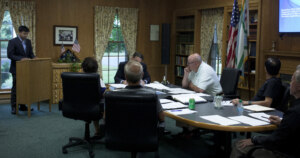Pension reform vote coming to suburban Chicago township
Barrington Township will be the first local government in Illinois to give taxpayers a vote on reforming the single-largest property tax driver in the state: public pensions. The advisory referendum will be on the ballot Nov. 5.
Barrington Township will be the first Illinois municipality to give taxpayers a vote on the single largest fiscal issue facing the state: Illinois’ nation-leading pension crisis.
The Barrington Township Board of Trustees voted unanimously, 5-0, to put a non-binding referendum on the Nov. 5 ballot to gauge community interest in changing the Illinois Constitution to allow government pension reform.
The referendum reads as follows:
“Do you support constitutional pension reform to protect workers’ existing retirements and generate savings which could provide property tax relief or be reinvested in the community?”
Illinois Policy Institue policy analyst Ravi Mishra testified Aug. 13 in favor of the ballot question.
“For over a decade, taxpayers have watched as your property taxes have increased and local governments have suffered as your budgets are stretched thin by the unfunded state pension mandate,” Mishra said. “We think it’s time to give voters a voice on this issue.”
The referendum was brought to the township and promoted by Barrington Township Republican Committeeman Peter Kopsaftis.
Illinois is home to the nation’s worst pension crisis, which has left taxpayers on the hook for $211 billion in unfunded state and local pension liabilities.
Not only is Illinois’ pension debt the largest in the U.S. as a percentage of the state’s gross domestic product, but it’s also the worst funded in the nation at about 51%.
It falls between the 60% experts describe as deeply troubled and funding ratios below 40% that are likely past the point of no return.
While decades of fiscal mismanagement by lawmakers is largely responsible for Illinois’ current pension predicament, residents have been forced to cover the growing costs, primarily through higher property taxes.
As a result, residential property taxes in Illinois have increased 215% since 1996.
Illinoisans now pay the second-highest property tax rate in the nation, with the typical homeowner spending more on their property tax bill than homeowners in Alabama, West Virginia, Arkansas, Louisiana and South Carolina combined.
It’s even worse for homeowners living in Cook County and the collar counties, which all ranked among the 100 most expensive for property taxes in the U.S.
A pension reform plan such as one originally developed by the Illinois Policy Institute – based loosely on bipartisan 2013 reforms that passed the Statehouse and were approved by the governor – would help to eliminate state and local unfunded pension liabilities and achieve retirement security for government pensioners without taking away current benefits. A constitutional amendment is needed because the Illinois Supreme Court ruled in 2015 that any changes were unconstitutional.
With polls showing nearly 3-in-5 Illinoisans believe the value of public services they receive are not worth the property taxes they pay, this referendum will empower local voters to communicate their priorities directly to state leaders and start building momentum for substantive property tax reform across Illinois.
Illinois municipal leaders interested in giving their voters a voice on the single-largest fiscal issue facing our state can contact Illinois Policy here.

